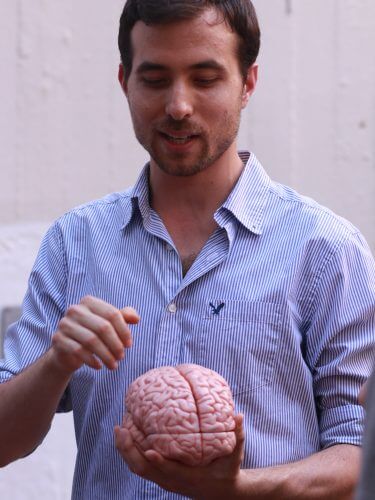The development won first place in the project conference of the Faculty of Biomedical Engineering

The annual project conference was recently held at the Faculty of Biomedical Engineering, where the students present the research and developments they worked on during the year. The presenters were undergraduate students who are in the fourth year of their studies.
The Dean of the Faculty Prof. Shulamit Levenberg thanked Liat and Doron Adler, who donate the prizes to the winners of the conference every year, and Associate Professor Nati Korin, who is responsible for the project course. She said that "the conference is one of the highlights in the life of the faculty, and the projects that the students present here bring to fruition all the knowledge they have gained in the faculty during their years of study. As in the world outside the academy, here too the students are required to combine many skills including engineering thinking, teamwork, creativity, entrepreneurial thinking and cooperation with different laboratories and companies."
In first place, and with a prize of NIS 1,500, the student Shaked Ron won for developing advanced methods for functional mapping of the cerebral cortex during brain surgery in the naked eye. Ron is a student on the track for a double degree in medicine and biomedical engineering, and he is engaged in research in the Gottfreund laboratory at the Rappaport Faculty of Medicine. He also works at Mazor Robotics, which was recently purchased by the giant Medtronic for $1.6 billion. Mazor's robotic systems, which assist surgeons in performing precise surgeries, are based on technology developed by Prof. Moshe Shom from the Faculty of Mechanical Engineering at the Technion.
According to Shaked Ron, "Awake Craniotomy is usually performed in cases of brain cancer or severe epilepsy. The functional mapping is carried out during the surgery, making it possible to remove as much of the abnormal tissue as possible without harming brain functions."
In the winning project, the Electrocoticography (ECoG) method was used, which may optimize and even replace the traditional mapping method in the future - electrical stimulation of the cerebral cortex (ECS). ECoG is a passive process, meaning a process that does not require the activation of stimulation, and experts in this field estimate that such a process will reduce the risk to the patient.
In the winning study, Shaked Ron developed a system that enables ECoG mapping of brain activity while synchronizing between giving assignments to the patient and recording electrical signals from the cerebral cortex. After processing the information, the system presents a decision-support image to the team in the operating room. The work was done under the guidance of Dr. Firas Moassi and Dr. Amit Livna from the Faculty of Biomedical Engineering, and Dr. Omer Zarhi from the Rabin Medical Center (Bilinson).
In second place, the students Amir Leon and Majed Mash'or won for their research on intercellular communication based on volatile organic components. The work was done under the guidance of Dr. Arbel Artzi-Schnirman in the laboratory of Prof. Hussam Haik from the Wolfson Faculty of Chemical Engineering.
Students Ora-Lee Abuchatzira and Nathalie Cohen won third place for developing an automatic process for the preparation of nanometer particles for the treatment of head and neck cancer. The work was done under the guidance of Dr. Arbel Artzi-Schnirman and Hagit Sasson-Bauer in the laboratory of Dr. Yossi Shamai from the Faculty of Biomedical Engineering.
In fourth place, the student Ofri Goldenberg and the student Yuval Ben Sasson won for developing a technology for automatic monitoring of a genetic disorder that affects the function of the heart. The work was done under the guidance of Ido Weiser-Biton and Aviv Rosenberg from the laboratory of Prof. Yael Yaniv in the Faculty of Biomedical Engineering.
The students Gal Schleifer and Yael Pistonovitch won fifth place for developing a recording system for analyzing cardiovascular signals. The work was done under the guidance of Aviv Rosenberg, Ido Weiser Biton and Yron Blinder in the laboratory of Prof. Yael Yaniv from the Faculty of Biomedical Engineering.
